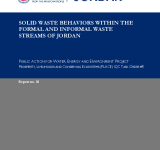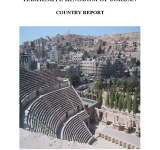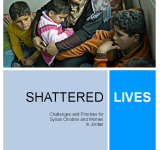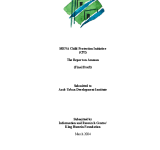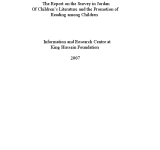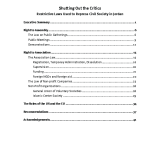عمان
يقدم هذا الفيديو شرحاً موجزاً حول المركز الوطني لحقوق الإنسان الذي باشر أعماله في الأردن في عام 2003. تتحدث رئيسة وحدة العدالة الجنائية في المركز نسرين زريقات عن المهام التي تشمل استقبال الشكاوى من
The report studies the formal and informal waste streams in Jordan as well as the public behaviors and attitudes that influence them. The study gives a specific emphasis to discovering the “drivers” of these practices as well as barriers to change and aims to locate examples of model behavior that already exists in Jordan so that they can be encouraged and duplicated. It investigates and assesses the four areas – the general attitudes of the Jordanian population towards waste and waste disposal;; informal waste reclamation sector in Jordan;; stream of recyclable material and the formal sanitation and waste management system of Amman and Aqaba. This research was conducted as part of the Public Action for Water;; Energy and Environment Project (PAP);; which aims to encourage water and energy conservation and to support behavior change towards more conservation and efficient practices both at the household level and in the commercial;; industrial and civil society arenas using social marketing behavioral methods. The study finds that there were high levels of awareness and concern about issues such as littering and recycling but it also concludes that the lack of concern amongst the broader public was cited as one principal reasons that people were not taking action. It calls for a quantitative research to confirm Jordanian attitudes on environmental issues.
The report was published from the World Health Organization/ United Nations Children’s Fund (WHO/UNICEF)’s pilot project to test a method for the rapid assessment of the quality of drinking-water in six countries;; including Jordan;; China;; Ethiopia;; Nicaragua;; Nigeria and Tajikistan. This assessment report aims to develop a tool that would support WHO/UNICEF’s joint program in strengthening the monitoring efforts of the global access to safe drinking water. The analysis of the report is based on the water samples and statistical data that were collected from 1600 drinking water supply sites in 67 clusters. The report finds that drinking water quality is generally high in the distribution network of Jordan and national standards for bacteria complies with the WHO guideline values. It also identifies the sanitary risk factors for Jordanian water supplies including the presence of sewer lines;; old pipes and failure to properly maintain household storage tanks.
With an executive summary on the Syrian refugees situation in Jordan;; the report combines the conclusions of detailed assessments in various areas including as child protection and gender-based violence;; education;; water sanitation and hygiene;; and nutrition and health. It provides a holistic picture of the situation faced by Syrian children and women in Jordan to draw out recommendations for necessary plans of action. Some key findings of the report include growing challenges for water;; sanitation and hygiene situation in Za’atari camp;; several threats to the nutritional status and health of Syrian girls;; boys and women and increasing violence against adolescents. Bringing together the voices of children and women at the camps;; the report examines the situations of Syrian refugees in host communities and refugee camps and finds key recommendations based on them.
This report aims to review the status of children in Greater Amman and to conduct a capacity assessment of key institutions addressing children’s issues. Various issues are examined;; covering areas such as health;; education;; and socio-economic characteristics. This report also reviews the status of disadvantaged children;; including working children;; orphans;; refugees;; and children with disabilities;; in order to identify vulnerabilities and risk factors specific to them. Finally;; this report assesses the capacity of selected institutions addressing children’s issues in Greater Amman and proposes phased capacity building programs based on the findings of the assessment.
This report examines social development in Jordan with respect to childhood education and literacy. The survey presented examines the status of children’s literature and encouraging reading in Jordan. The report assesses the promotion of children’s literature in Jordan through various axes;; including the quality and prevalence of libraries;; the effectiveness of policies;; and the existence of civil institutions active in the field of children’s literature. The report also identifies various trends with respect to children’s literature through concentrated discussion groups with families;; teachers;; children;; and writers of children’s literature.
يهدف هذا التقرير إلى دراسة ظاهرة تدخين السجائر والأرجيلة بين المراهقين من الفئة العمرية 15-18 سنة. ويحاول التقرير دراسة أسباب انتشار هذه الظاهرة;; ومدى وعي الأشخاص بمخاطر التدخين والخيارات المتاحة أمامهم لترك هذه العادة. وشمل البحث 1442 طالب وطالبة من مدارس خاصة وحكومية ومدارس وكالة الغوث للاجئين الفلسطينيين;; وغطى البحث محافظات اربد;; الزرقاء;; وعمان


